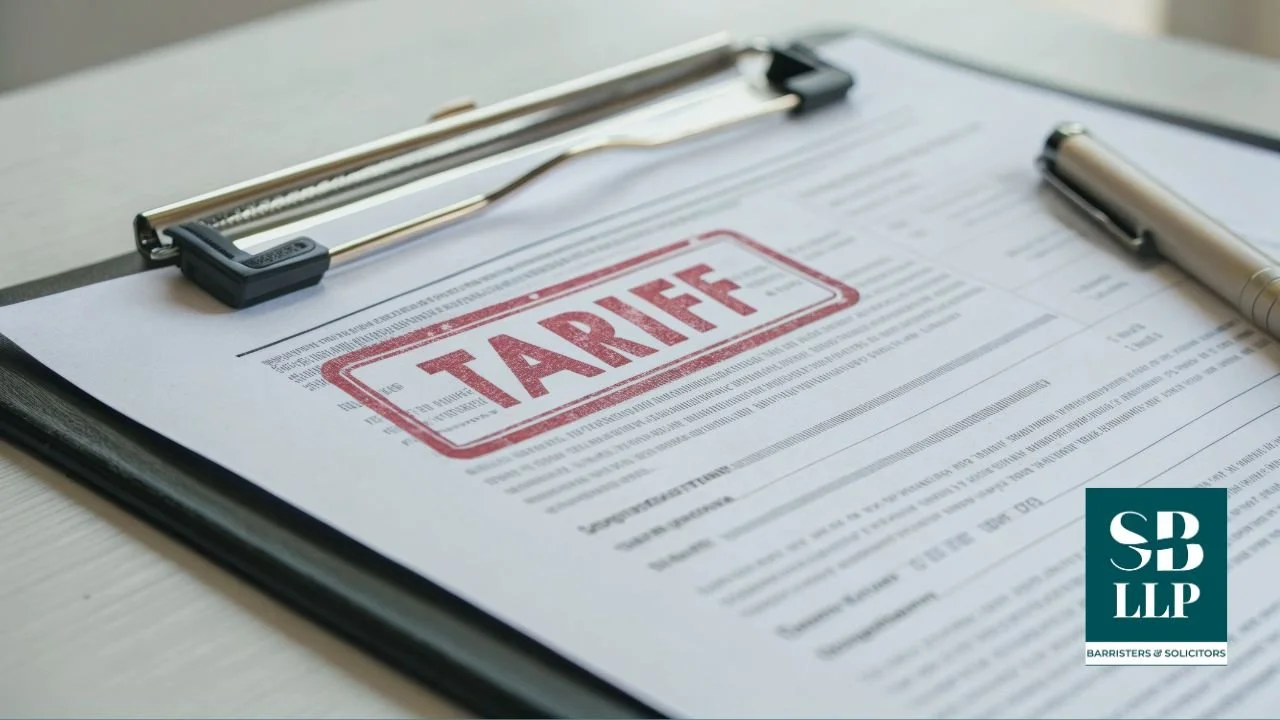Revising Force Majeure and Frustration Clauses Post-Tariffs: Lessons from the 2025 U.S. - Canada Trade Clash
Written by: Dr. Rupak Sarma
The 2025 escalation of tariffs between Canada and the United States has tested the strength of commercial contracts across industries. Businesses suddenly find themselves facing increased costs, disrupted supply chains, and uncertain delivery schedules. As Edmonton-based corporate lawyers, we’re seeing an uptick in inquiries about how the 2025 U.S.-Canada tariffs are affecting commercial contracts, especially force majeure and frustration clauses.
This article explores whether force majeure or frustration clauses in a commercial contract can provide relief from rising costs.
Force Majeure
A force majeure clause excuses a party from performing its contractual obligations when extraordinary events, outside of that party’s control, prevent or delay performance. These clauses usually list specific unexpected events such as natural disasters, wars, strikes, pandemics, or government orders. Because courts interpret force majeure clauses narrowly, the event must fall within the wording of the clause. The effect is typically to suspend obligations for the duration of the event, though some clauses also allow termination if the event continues for an extended period.
Frustration
Frustration is a common law doctrine that applies when an unforeseen event fundamentally changes the nature of the contract, making performance impossible or radically different from what was originally agreed. Unlike force majeure, frustration does not need to be written into the contract - it operates automatically in law, but courts apply it sparingly. Increased difficulty or expense does not amount to frustration; the event must destroy the contract’s core purpose. When frustration is established, the contract ends, and both parties are discharged from further obligations.
These clauses were designed to address unforeseen events beyond a party’s control. But tariffs - given their history in the 2018 and 2025 trade disputes - are no longer easy to argue as “unforeseeable.” Courts are often reluctant to excuse performance simply because a contract has become more expensive to perform. That leaves many companies exposed.
Tariffs and the Challenge of Foreseeability
To rely on force majeure, the event must usually be something the parties could not reasonably have anticipated when they signed the contract. With tariffs now a recurring feature of North American trade relations, arguing that they were entirely unexpected has become increasingly difficult. For contracts entered into before 2017, when tariffs were not yet a regular feature, a party could plausibly claim that the imposition of significant new tariffs was unforeseeable and therefore within the scope of a force majeure clause. However, for contracts made after tariffs became a recurring policy tool, it is much harder to characterize them as unforeseen. In other words, the strength of a force majeure argument depends on whether the tariffs were reasonably predictable when the parties entered into the agreement.
The doctrine of frustration, which can terminate a contract when an event makes performance impossible, also provides limited help. Canadian courts apply it narrowly, and higher costs alone rarely meet the threshold. That means many businesses are left bearing the financial brunt of tariff changes unless their contracts are carefully drafted to include clauses for this specific purpose.
Government Responses Add Complexity
Adding to the uncertainty is the pace at which governments have responded to tariff developments.
In 2025, Canada retaliated with tariffs on billions of dollars’ worth of U.S. goods, then later introduced targeted duty relief measures for certain industries. By the summer of 2025, the Federal government had begun rolling back some of its retaliatory measures as negotiations progressed.
For businesses, this constant back-and-forth makes planning difficult. Contracts need to anticipate not only the imposition of tariffs but also their partial removal, replacement, or mitigation through government policy.
Updating Force Majeure and Frustration Clauses
So, how can businesses better protect themselves? The answer lies in updating and modernizing contract clauses to reflect the realities of today’s trade environment.
1) Be explicit about tariffs.
Instead of relying on general references to “acts of government” or “laws beyond the parties’ control,” contracts should specifically list tariffs, trade restrictions, or retaliatory duties as events that trigger relief.
2) Expand the “change in law” provisions.
Many agreements already include a clause dealing with changes in law. These can be updated to make clear that cross-border trade measures, such as tariffs, are covered to ensure that parties have a defined process to adjust pricing or timelines as new tariffs arise.
3) Go beyond time extensions.
Standard force majeure clauses often only allow for extensions of time. But tariffs primarily affect cost. Contracts should provide mechanisms for cost adjustments, price renegotiations, or shared risk allocation when tariffs significantly alter the financial landscape.
4) Build in notice and mitigation duties.
A well-crafted clause should require the affected party to notify its counterparty promptly, provide reasonable evidence of the impact, and make efforts to mitigate the effect. For example, by seeking alternative suppliers or applying for government relief (if available).
5) Avoid the “all or nothing” of frustration.
Frustration terminates a contract completely, which is rarely in either party’s best interest and often leads to litigation. Instead, consider adding tiered responses such as: suspension for a defined period of time, good-faith renegotiation, and termination, only as a last resort.
Practical Examples
A Canadian manufacturer relying on U.S. steel could face sudden cost spikes if tariffs - such as those imposed under Section 232 in 2018 - are applied or re-imposed. With a proper change-in-law clause, the parties could revisit pricing rather than being forced into a dispute.
A construction contractor importing specialized equipment from the U.S. could rely on a tariff-specific contractual clause - designed to address cost increases - to allow for project rescheduling or adjustments, rather than invoking a standard force majeure provision. A public procurement contract could acknowledge that certain government relief programs or tariff rollbacks will automatically modify pricing, avoiding drawn-out negotiations.
Staying Ahead
Trade disputes are not going away. If anything, the 2025 U.S. - Canada clash has shown that tariffs can be used quickly and strategically, often with little warning. Businesses that rely on outdated boilerplate provisions may find themselves without protection just when they need it most.
By contrast, those that take the time to review and strengthen their contracts now will be better equipped to weather the next round of economic turbulence - whatever form it takes.
SB LLP Can Help
Whether you are renegotiating supply agreements, drafting construction contracts, or entering new cross-border ventures, our team can help you update your force majeure and frustration clauses to address tariff risks and other trade-related disruptions.
At SB LLP, we understand that contracts need to do more than reflect today’s business environment and need to anticipate tomorrow’s surprises. We are happy to help you navigate your business’s legal challenges with confidence.

